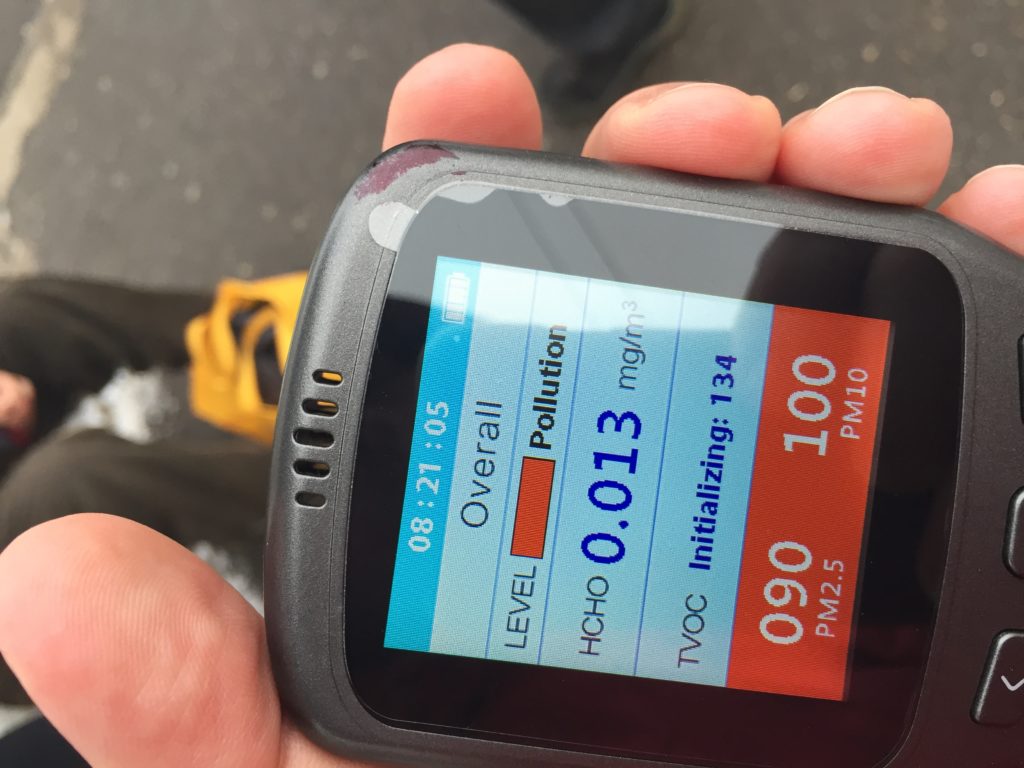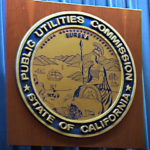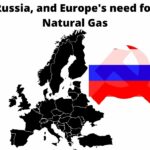Last week, on the eve of instituting a tax on polluting cars entering the central area of Bucharest, the Mayor of Bucharest, Gabriela Firea, abandoned the so-called Oxygen Tax plan. Under the plan cars not meeting the Euro 3 criteria would be banned from the center of Bucharest, and overall the polluting cars would be required to pay fees to continue driving in Bucharest. The decision to abandon the tax came after Firea held an online discussion on Facebook, receiving a lot of negative feedback. Coincidentally, over the weekend a major air pollution occurred in Bucharest, apparently causing quite a ruckus among the people, and Dacia (a car-maker owned by Renault) announced its first electric car.
Taken together these actions are a sign that Bucharest needs to address serious air quality issues, but the population is not on board with that need.
On my last visit to Bucharest I had with me a portable air quality measuring device. It showed that air quality in Bucharest was in the unhealthy range in several areas of the city.

I see in the news that a study was published![]() , in November 2019, showing that Romanians lose eight months of their lives due to high air pollution. Then in November 2018, it was reported
, in November 2019, showing that Romanians lose eight months of their lives due to high air pollution. Then in November 2018, it was reported![]() that Romania sought to significantly cut the environmental budget, while Bucharest was under threat of a daily fine for bad air quality.
that Romania sought to significantly cut the environmental budget, while Bucharest was under threat of a daily fine for bad air quality.
Therefore.. The so-called Oxygen Tax plan would have been a good thing for air quality in Bucharest. Not only would it have decreased traffic congestion, it would have limited the number of polluting cars in the city center. It was due to go into effect on March 1, and there were many drivers to paid the required fee’s to continue driving in the center of Bucharest.
However, in mid-February Firea posted a survey on Facebook![]() . According to reporting, it drew over 60,000 comments, 90% of which were against the Oxygen Tax. Hotnews.ro
. According to reporting, it drew over 60,000 comments, 90% of which were against the Oxygen Tax. Hotnews.ro![]() posted this comment from Firea:
posted this comment from Firea:
“The decision will turn into a General Council decision in March and the decision is that I will give up the Oxigen vignette. I will come up with a cancellation project, but that doesn’t mean we will give up. I do not abandon the Oxygen project because it includes several projects, planting trees, purchasing less polluting cars, bicycle lanes, checking the polluting sites, streets, passage bridges. About 1600 Bucharest people bought the vignette, totaling 76,000 euros, all will receive their money back ”
Gabriela Firea – via hotnews.ro – translated by Google Translate
“Do we want more cars in traffic? It seems so. Do we want to have more polluting cars in traffic? It seems so. This popular consultation revealed a very clear answer, the citizens reject the idea of ecological restriction and vignette. At this moment we are not willing to agree with a measure that has been successful throughout Europe, ”
As a practical matter there are a lot of old cars, and a lot of polluting cars, in Bucharest. The Hotnews report claims there are 375,000 such cars. Hence there would be a steep cost incurred by those who would be incentivized to replace their cars with clean ones.
The coincidence – High pollution event on Sunday evening
Coincidentally, there was an ultra-high pollution event in Bucharest over the weekend. According to a report on Digi24.ro![]() , pollution levels for PM2.5 particulates were 900-1,000% above the maximum permissible limits, and PM10 particulates were about 800% above permissible limits. The event began on Sunday evening, and lasted until mid-day Monday.
, pollution levels for PM2.5 particulates were 900-1,000% above the maximum permissible limits, and PM10 particulates were about 800% above permissible limits. The event began on Sunday evening, and lasted until mid-day Monday.
To compound the problem it seems it isn’t clear what caused the issue. The Digi24 report says several folks wrote them complaining about a burning smell. Mayor Firea said![]() that there are six air quality monitoring stations in Bucharest. As a result she wants to buy more air quality monitoring equipment that will be owned and operated by the City.
that there are six air quality monitoring stations in Bucharest. As a result she wants to buy more air quality monitoring equipment that will be owned and operated by the City.
Instead of a government-led monitoring system showing data about the issue, the best data is coming from a private air monitoring network https://aerlive.ro/![]() . The air quality event was posted by Aerlive on Monday:
. The air quality event was posted by Aerlive on Monday:
The comments to that post include a lot of anecdotal evidence about industrial activities and unregulated burning.
The environment minister, Costel Axele, suggested![]() that illegal burning of waste that is illegally imported from the UK could have been the cause. The police
that illegal burning of waste that is illegally imported from the UK could have been the cause. The police![]() have opened an investigation into the issue. According to Axele, in just the last week investigators found 25 shipping containers at the port in Costanta (a major port on the Black Sea) containing waste disguised as imports of household appliances. The cause is a discrepancy in fees – in the UK the fee is 400 pounds per ton, while in Romania it is 30-40 euros per ton.
have opened an investigation into the issue. According to Axele, in just the last week investigators found 25 shipping containers at the port in Costanta (a major port on the Black Sea) containing waste disguised as imports of household appliances. The cause is a discrepancy in fees – in the UK the fee is 400 pounds per ton, while in Romania it is 30-40 euros per ton.
Coincidence – Romania-based Dacia announces its first all-electric car
At the same time as all this, Dacia (the Romania-based car maker owned by Renault) announced its first all-electric car.
The primary selling point of the Dacia Spring is that it will be the cheapest electric car in Europe. It looks to be a very small car, but it has four full-size seats and a 200 kilometer electric range.
See: Renault brand Dacia unveils most affordable electric car in Europe
Bottom line
Romania is one of Europe’s poorest countries, despite having a population full of intelligent and resourceful people.
In January we noted that under current EU regulations, Romania will have to eliminate 40% of its electricity production due to the EU Green New Deal, but it’s unclear if the country can afford to replace that electricity production with renewable energy resources. The expenditures required are steep, and the EU might (or might not) come through with support.
In reading the news articles linked above – we saw frequent mention of how underpaid the environmental enforcement agents are, and the inadequacy of the air quality monitoring system. All that seems to derive from a government that’s barely able to stay afloat. For example in February, the EU announced it was placing Romania under economic scrutiny because the government is running too-high of a debt.
- Is there enough Grid Capacity for Hydrogen Fuel Cell or Battery Electric cars? - April 23, 2023
- Is Tesla finagling to grab federal NEVI dollars for Supercharger network? - November 15, 2022
- Tesla announces the North American Charging Standard charging connector - November 11, 2022
- Lightning Motorcycles adopts Silicon battery, 5 minute charge time gives 135 miles range - November 9, 2022
- Tesla Autopilot under US Dept of Transportation scrutiny - June 13, 2022
- Spectacular CNG bus fire misrepresented as EV bus fire - April 21, 2022
- Moldova, Ukraine, Georgia, Russia, and the European Energy Crisis - December 21, 2021
- Li-Bridge leading the USA across lithium battery chasm - October 29, 2021
- USA increasing domestic lithium battery research and manufacturing - October 28, 2021
- Electrify America building USA/Canada-wide EV charging network - October 27, 2021















